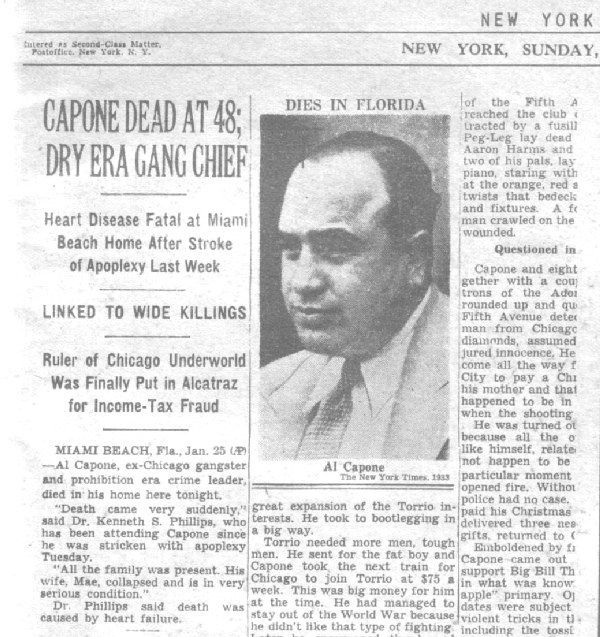The Fascinating Final Years of Al Capone
The Mafia is often and�commonly linked with the epidemic of drug circulation�and wider drug culture, but much less is mentioned about any Mafia connections to the other epidemic that is currently blighting America: the rise of sexually transmitted diseases. And yet the most famous mobster of all time, Al Capone, actually died as a result of the sexually transmitted disease he contracted in his youth. So how exactly did Capone contract the disease? And how did it affect his life before, ultimately, being partly to blame for his relatively early death?
Contracting Syphilis
 |
Al Capone
Alcatraz mugshot Dec 31, 1930
|
When he was 20 years old, Capone left his native New York for Chicago where he was invited to become a bouncer in a brothel. Despite being married just a year earlier, it was thought to be at this point that Capone contracted syphilis (although other reports suggest it was caught from a prostitute before his marriage).�In 1906�
a treatment for syphilis was found�and it was often postulated that timely use of Salvarsan (the new treatment for syphilis that was in use at the time) could have cured Capone of the syphilis that would blight him for the rest of his life, however Capone chose not to seek medical treatment or advice about his ailment: a decision that ultimately would prove to be fatal. The symptoms of syphilis can take a long time to present themselves, and if you do have initial symptoms they can disappear quickly [1] so it could well be that Capone didn�t realize he had contracted the condition until it was too late. Untreated, syphilis can lead to syphilitic dementia which has been shown to cause unprovoked aggression[2] and wider dementia; another illness which has aggression at its heart. It is this dementia that Capone suffered from in the years after his release from prison and before his death and that ultimately affected and drove his behavior.
Dementia in His Later Life
 |
|
Al Capone's cell in Eastern State Penitentiary
|
In 2013 letters that showed Capone�s demise into syphilitic dementia were revealed for the first time when they were sold by a New Hampshire auction house.[3] Those letters offer a wonderful insight into the later life of the infamous mobster. Although the notoriously violent mobster killed many people throughout the course of his career, he never killed any innocent members of the public. However once he was in the grips of dementia, his family chose to hire a male nurse who would pose as a chauffeur in order to protect the public from the gangster's violent outbursts which were caused by his illness. According to the specialist syphilis doctor who treated Capone following his release from prison and until his death, when he first came into his care Capone had the mental capacity of a seven year old. After extensive treatment this was increased to the levels of mental capacity of a forteen year old but he was still considered to be �silly, childish and mentally deteriorated� and this was a situation that would not change before his death.His syphilis could not be cured and although the official cause of his death was attributed to pneumonia followed by a heart attack, his syphilis was considered to be a secondary cause and contributing factor.�As well as the letters, Capone�s medical records, his death certificate and several photos of him both during his life and in his bronze casket shortly after his death were also sold.�They all made for fascinating reading and provide a fascinating insight into the death of the man.
 |
Al Capone
New York Times headlines January 26, 1947
|
Capone is often romanticized [4] as America�s greatest gangster, however there is nothing romantic or glamorous about�the realities of the life�the man lived. In knowing more about Capone�s unglamorous death that was caused by, at least in part, the bad lifestyle decisions he chose to make, is it hoped that we will no longer romanticize the collapse of law and order that happened in America during the 1920s and instead move away from mob rule into a world of compassion and kindness instead.
Key Sources
[1]�http://history1900s.about.com/od/people/a/Al-Capone.htm
[2]�http://www.healthplexus.net/article/nonpharmacological-management-agitated-behaviours-associated-dementia
[3]�http://www.dailymail.co.uk/news/article-2334249/Letters-notes-illustrate-Al-Capones-descent-dementia-sale.html
[4]�http://www.myalcaponemuseum.com/id100.htm


 Emma Stevens is a London based Business and Finance writer.
Emma Stevens is a London based Business and Finance writer.